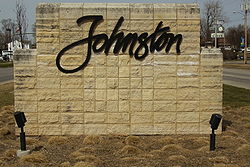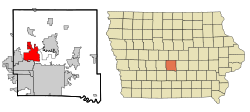Johnston is a city in Polk County, Iowa, United States. The population was 24,064 in the 2020 census, a large increase from the 8,649 population in 2000.[3] It is part of the Des Moines–West Des Moines Metropolitan Statistical Area.
Johnston, Iowa | |
|---|---|
 Johnston welcome sign | |
| Motto: Thrive. Every Day. | |
 Location of Johnston, Iowa | |
| Coordinates: 41°41′28″N 93°43′25″W / 41.69111°N 93.72361°W | |
| Country | |
| State | |
| County | Polk |
| Incorporated | September 18, 1969 |
| Government | |
| • Type | Mayor-council government |
| • Mayor | Paula Dierenfeld |
| Area | |
• Total | 20.88 sq mi (54.07 km2) |
| • Land | 19.39 sq mi (50.23 km2) |
| • Water | 1.48 sq mi (3.84 km2) |
| Elevation | 824 ft (251 m) |
| Population (2020) | |
• Total | 24,064 |
| • Rank | 24th in Iowa |
| • Density | 1,240.92/sq mi (479.12/km2) |
| Time zone | UTC-6 (Central (CST)) |
| • Summer (DST) | UTC-5 (CDT) |
| ZIP code | 50131 |
| Area code | 515 |
| FIPS code | 19-39765 |
| GNIS feature ID | 2395474[2] |
| Website | www.cityofjohnston.com |
Johnston is the location of the headquarters of Pioneer Hi-Bred Seeds, Iowa Public Television, and The Gardeners of America/Men's Garden Clubs of America. Also located here are the Camp Dodge Military Reservation as well as the Paul J. and Ida Trier House, a private residence designed by architect Frank Lloyd Wright, and the Des Moines Weather Forecast Office of the National Weather Service.[4]
History
editJohnston was established in 1905 as a station on the Des Moines & Central Iowa Railway between Des Moines and Perry known as Johnston Station.[5] It was named for the railway's freight supervisor, John F. Johnston.[6] Passenger service along the railroad ended in 1949, and the track has subsequently been removed within city limits.[5]
Voters passed a resolution to incorporate on June 23, 1969. On September 8, the first Mayor and Council were sworn in. Incorporation papers were signed by the Clerk of the District Court on December 11, 1969.
At the time, the Johnston Station area did not become part of the incorporated city because of a state law that prevented a town within three miles (5 km) of another city from incorporating. The neighboring cities of Des Moines and Urbandale were also interested in that land, but in April 1970, Johnston and Urbandale reached an agreement that allowed Johnston to annex the Johnston Station area.[7]
Geography
editAccording to the United States Census Bureau, the city has a total area of 18.37 square miles (47.58 km2), of which 17.16 square miles (44.44 km2) is land and 1.21 square miles (3.13 km2) is water.[8]
The city is bordered on the east by the Des Moines River and the city's area includes part of Saylorville Reservoir. On the south, the city is bordered by Interstate 80 and to the west, the city limits extend to a half mile east of Iowa Highway 141. The city is bisected by Beaver Creek, which flows southerly through the city until it nearly reaches Interstate 80, at which point the course turn easterly and flows to the Des Moines River.
Demographics
edit| Census | Pop. | Note | %± |
|---|---|---|---|
| 1970 | 222 | — | |
| 1980 | 2,526 | 1,037.8% | |
| 1990 | 4,702 | 86.1% | |
| 2000 | 8,649 | 83.9% | |
| 2010 | 17,278 | 99.8% | |
| 2020 | 24,064 | 39.3% | |
| U.S. Decennial Census[9][3] | |||
2020 census
editAs of the census of 2020,[10] there were 24,064 people, 9,194 households, and 6,328 families residing in the city. The population density was 1,240.9 inhabitants per square mile (479.1/km2). There were 9,896 housing units at an average density of 510.3 per square mile (197.0/km2). The racial makeup of the city was 81.7% White, 5.9% Black or African American, 0.2% Native American, 6.3% Asian, 0.0% Pacific Islander, 1.3% from other races and 4.7% from two or more races. Hispanic or Latino persons of any race comprised 3.9% of the population.
Of the 9,194 households, 36.5% of which had children under the age of 18 living with them, 57.0% were married couples living together, 5.2% were cohabitating couples, 23.9% had a female householder with no spouse or partner present and 13.9% had a male householder with no spouse or partner present. 31.2% of all households were non-families. 25.2% of all households were made up of individuals, 10.4% had someone living alone who was 65 years old or older.
The median age in the city was 37.0 years. 29.8% of the residents were under the age of 20; 6.1% were between the ages of 20 and 24; 25.2% were from 25 and 44; 25.1% were from 45 and 64; and 13.8% were 65 years of age or older. The gender makeup of the city was 48.4% male and 51.6% female.
2010 census
editAt the 2010 census there were 17,278 people, 6,369 households, and 4,720 families living in the city. The population density was 1,006.9 inhabitants per square mile (388.8/km2). There were 6,618 housing units at an average density of 385.7 per square mile (148.9/km2). The racial makeup of the city was 91.0% White, 2.2% African American, 0.1% Native American, 4.6% Asian, 0.6% from other races, and 1.5% from two or more races. Hispanic or Latino of any race were 2.0%.[11]
Of the 6,369 households 42.2% had children under the age of 18 living with them, 64.4% were married couples living together, 6.8% had a female householder with no husband present, 2.9% had a male householder with no wife present, and 25.9% were non-families. 20.7% of households were one person and 6.9% were one person aged 65 or older. The average household size was 2.67 and the average family size was 3.14.
The median age was 36.9 years. 29.9% of residents were under the age of 18; 5.8% were between the ages of 18 and 24; 28.7% were from 25 to 44; 25.6% were from 45 to 64; and 9.9% were 65 or older. The gender makeup of the city was 49.0% male and 51.0% female.
2000 census
editAt the 2000 census there were 8,649 people, 3,216 households, and 2,318 families living in the city. The estimated population of Johnston in 2009 was 16,161 people. The population density was 602.8 inhabitants per square mile (232.7/km2). There were 3,406 housing units at an average density of 237.4 per square mile (91.7/km2). The racial makeup of the city was 96.20% White, 0.58% African American, 0.10% Native American, 2.00% Asian, 0.49% from other races, and 0.64% from two or more races. Hispanic or Latino of any race were 1.53%.[12]
Of the 3,216 households 39.5% had children under the age of 18 living with them, 65.1% were married couples living together, 5.1% had a female householder with no husband present, and 27.9% were non-families. 23.3% of households were one person and 9.3% were one person aged 65 or older. The average household size was 2.61 and the average family size was 3.13.
Age spread: 29.7% under the age of 18, 5.2% from 18 to 24, 31.6% from 25 to 44, 22.6% from 45 to 64, and 10.9% 65 or older. The median age was 36 years. For every 100 females, there were 96.6 males. For every 100 females age 18 and over, there were 88.8 males.
The median household income was $76,094 and the median family income was $97,322. Males had a median income of $61,585 versus $36,008 for females. The per capita income for the city was $36,407. About 2.0% of families and 4.1% of the population were below the poverty line, including 2.4% of those under age 18 and 10.8% of those age 65 or over.
Economy
editCorteva Agriscience and John Deere Financial are based in Johnston.[13]
Education
editThe Johnston Community School District serves the city.
Transportation
editTransit in the city is provided by Des Moines Area Regional Transit. Routes 5 and 93 provide bus service connecting the city to the region.[14]
References
edit- ^ "2020 U.S. Gazetteer Files". United States Census Bureau. Retrieved March 16, 2022.
- ^ a b U.S. Geological Survey Geographic Names Information System: Johnston, Iowa
- ^ a b "2020 Census State Redistricting Data". census.gov. United states Census Bureau. Retrieved August 12, 2021.
- ^ "NWS Forecast Office Des Moines, IA". National Weather Service. Retrieved June 1, 2016.
- ^ a b "Inter-Urban Railway Electric Substation at BrennanLast surviving connection to the interurban railway and Johnston Station?" (PDF). Retrieved January 2, 2021.
- ^ Henning, Barbara Beving Long; Patrice K. Beam (2003). Des Moines and Polk County: Flag on the Prairie. Sun Valley, California: American Historical Press. ISBN 1-892724-34-0.
- ^ Lutz, Renda (September 14, 2004). "Town's Early Years Proved Bumpy". The Des Moines Register.
- ^ "US Gazetteer files 2010". United States Census Bureau. Archived from the original on February 20, 2011. Retrieved May 11, 2012.
- ^ "Census of Population and Housing". Census.gov. Retrieved June 4, 2015.
- ^ "2020 Census". United States Census Bureau.
- ^ "U.S. Census website". United States Census Bureau. Retrieved May 11, 2012.
- ^ "U.S. Census website". United States Census Bureau. Retrieved January 31, 2008.
- ^ Greater Des Moines Partnership. "Large Private and Publicly Held Employers, Greater Des Moines" (PDF). Retrieved June 19, 2012.[permanent dead link]
- ^ "DART System Map". Retrieved August 28, 2023.